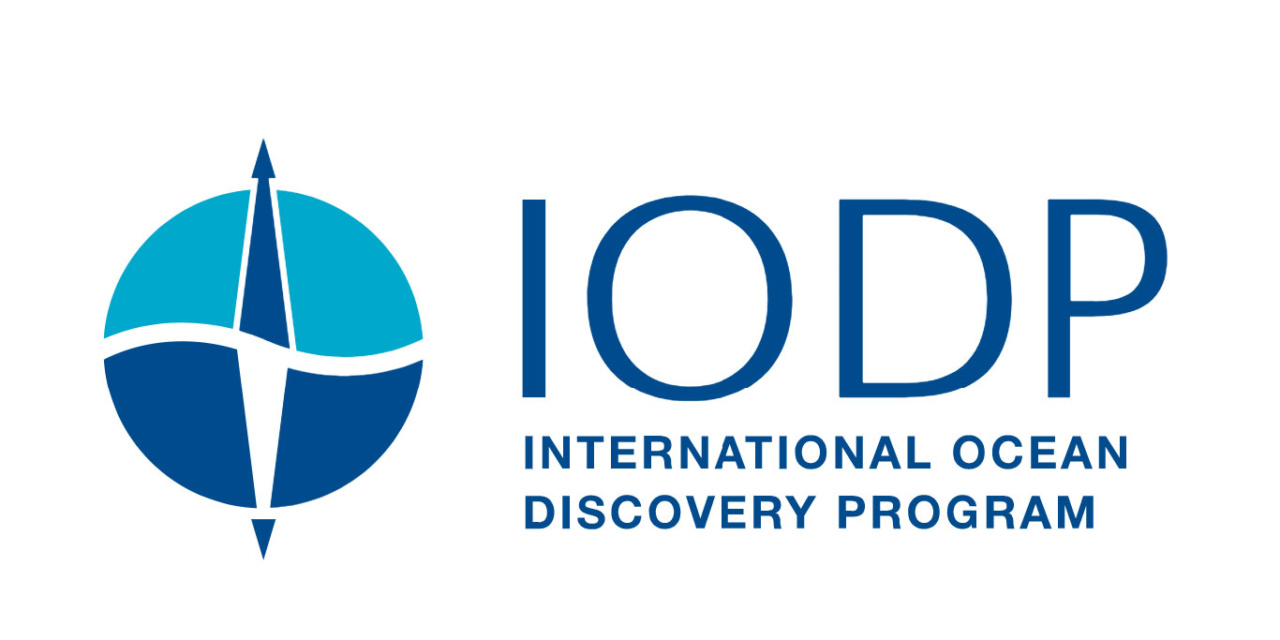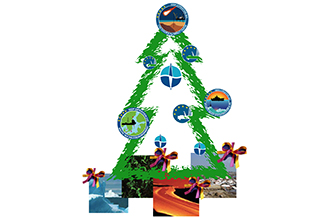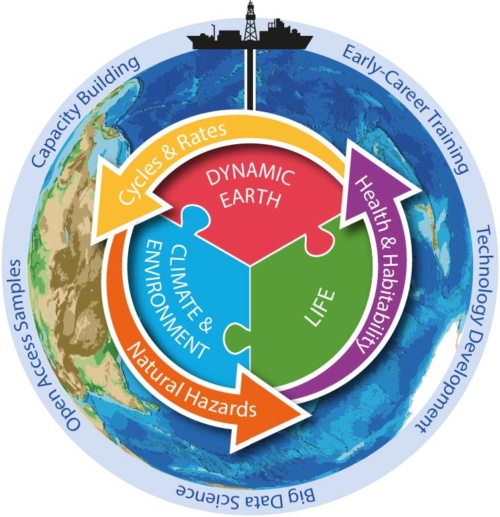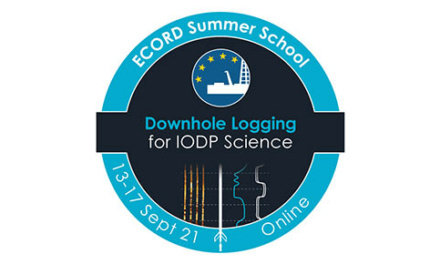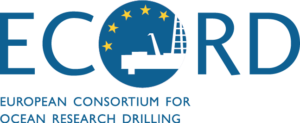JOIDES Resolution Facility Board, 5 January 2021
Dear IODP Community,
Happy, safe, and productive 2021 to all of you and here’s hoping for a much better year relative to 2020! I am hopeful that, at some point in 2021, we can get back to normal operations of the JOIDES Resolution. Though the JRSO has made monumental efforts to keep the ship productive during 2020 through much-needed ship repairs and improvements, Expedition 384 (Engineering Testing), and preparation work for Expeditions 390/393, IODP expeditions could not be implemented after the early conclusion of Expedition 378 last February. This resulted in some hard decisions for the JRFB, such that we held the first ever out-of-sequence meeting on 23 November 2020 and developed a number of critical consensus statements. I am writing to provide some explanation about the meeting results and inform you of the path we have taken to ensure we move into 2021 and beyond with a firm foundation from which to grow the next era of scientific ocean drilling. I want to highlight two results of this meeting now to ensure you are aware:
- We will not be requesting new proposals for the JR that address the current science plan for the 1 April 2021 deadline;
- We will be requesting community input from 1 February 2021 on implementation of the Science Framework via a Request for Information (RFI).
Not being able to implement IODP expeditions for much of 2020 and 2021 means that the number of JR proposals currently at SEP and the JRFB are more than enough to schedule through the end of the program and into 2024 (for context, see 2019 JRFB meeting Consensus Statement 3). Therefore, we have decided not to request new proposals for the JR that address the current science plan for the 1 April 2021 deadline (see November 2020 JRFB meeting Consensus Statement 3). Exceptions to this are the new Land-2-Sea proposals, as well as those proposals reviewed by the SEP in 2020 that were deactivated but where the proponents were encouraged to re-submit. Revisions to proposals already in the system and Ancillary Project Letters will be also be accepted. Unfortunately, we are not yet in a position to accept proposals that address the new 2050 Science Framework (more details on this are below).
A significant positive highlight in future planning was the IODP Forum endorsement of the new 2050 Science Framework (SF). Again, we owe a huge debt of gratitude to Anthony Koppers, Roz Coggon, and their team for completing the SF in such a short time AND during a pandemic! The innovative SF is very different from the current Science Plan and, as became evident during the Forum meeting, implementation will be challenging because that innovation must now be matched in its implementation. Therefore, the JRFB has established a Working Group (WG) to consider requirements and review processes for proposals that would use an anticipated U.S. global ranging, non-riser drilling platform to address the SF (see Consensus Statement 2). The WG has been asked to focus on innovative ways for requesting, formulating, and reviewing proposals to address the SF and specifics can be found in the November 2020 JRFB meeting minutes.
I have asked JRFB member Ken Miller to chair this WG, which is comprised of Cara Burberry, Gail Christeson (SEP co-chair), Sean Gulick, Susan Humphris, Lisa McNeill (SEP co-chair), Dick Norris, and Brandi Reese. I want to thank everyone listed here for agreeing to serve on this very important WG. Ex-officio members are the Forum and JRFB Chairs, as well as representatives from the CIB, EFB, NSF, SSO and JRSO. The initial meeting of the WG was held (virtually, of course!!) on 17 December 2020, resulting in a set of consensus statements and actions. The WG report is due at the 2021 JRFB meeting, currently scheduled to be held in-person in La Jolla, California, 23-25 June 2021. At that time, specific criteria for new proposals addressing the SF should be available and we should be in a position to define when those new proposals will be accepted.
The JRFB will also issue a “Request For Information” (RFI) to the international community to provide input for preparing to transition from the IODP Science Plan to the 2050 Science Framework. Responses will focus on new proposal ideas and will be collected through a web-based form that should take no more than 10 minutes to complete. Responding to the RFI is critical for the JRFB WG, NSF (in terms of what a new U.S. drilling platform will look like), the JRFB and other facility boards/platform providers (to aid in SF implementation, and the IODP Forum as it oversees SF implementation). See Consensus Statement 4. The SSO will begin collecting RFI responses on 1 February 2021. While results will be used to inform the JRFB WG and their June 2021 report, the data are vital for several other important issues, so there is no hard deadline for submitting results. Details will be sent via a future email, and I ask you to please submit responses to the best of your ability. Your input is vital and needed, noting this is an initial step in information gathering.
As you can see from the new schedule plan, the JR is in a period of tie up in Cape Town until early February. (There have been some fantastic pictures of Table Mountain coming from the @TheJR Twitter feed!!) After this tie up period, the ship will complete the re-entry installations for Expeditions 390/393, then move on to Expedition 395E. Expedition 395E was originally intended to prepare Hole U1309D for re-entry so that proposal P937 could be scheduled at the 2021 JRFB meeting. However, some planned tests that were not completed during Expedition 384 will also be conducted during this now-hybrid expedition 395E. Consensus Statement 1 addresses some issues that have arisen regarding sampling, equipment tests, and the creation of a Sample Allocation Committee for Expedition 395E (see my September 2020 letter for details on scheduling changes).
In closing, I want to state that while 2020 was immensely challenging for scientific ocean drilling, I am optimistic for the future. We belong to a vibrant and innovative international community, as demonstrated by the SF. We must continue to be innovative in the implementation of the SF.
Again, I wish you all a happy, safe, and productive 2021!
Sincerely yours,
Clive R. Neal
Chair, JOIDES Resolution Facility Board
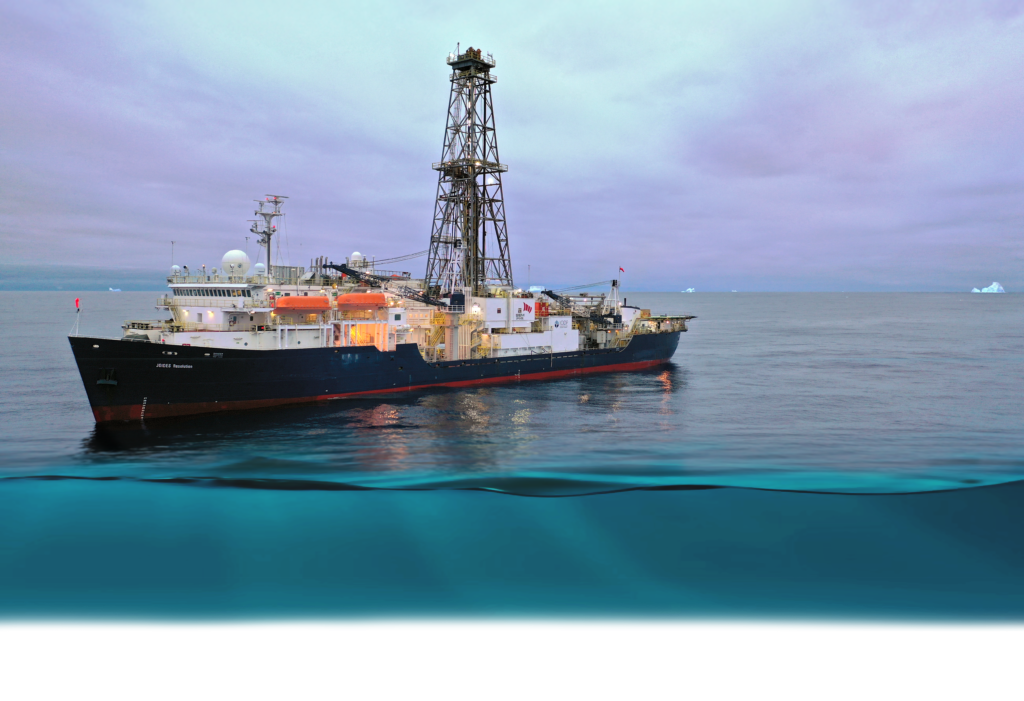
JOIDES Resolution in the Admunsen Sea during IODP Expedition 379 (photo credits P. Christie, IODP)

